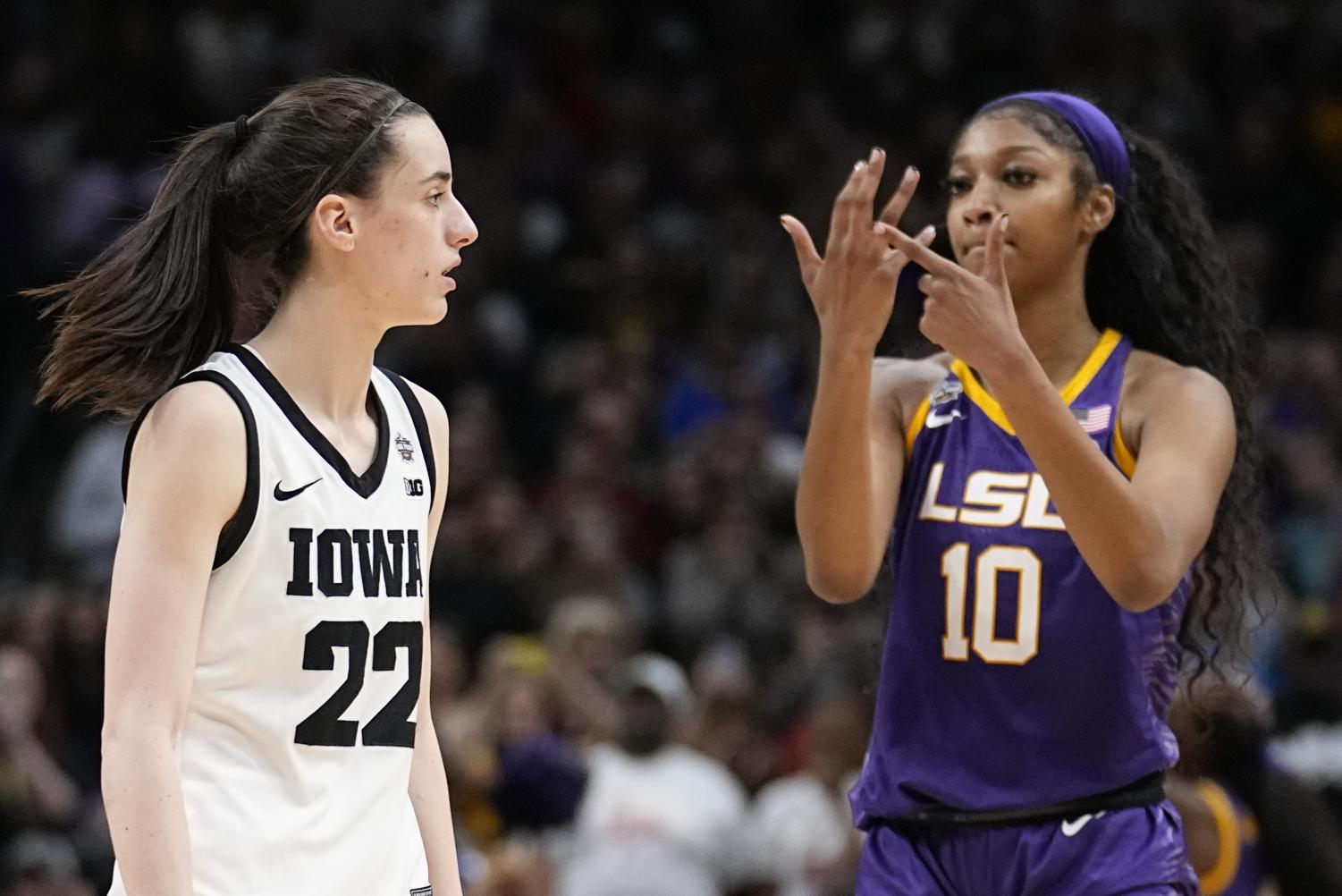Column | Intolerance evident after NCAA women’s basketball title game


LSU's Angel Reese reacts in front of Iowa's Caitlin Clark during the second half of the NCAA Women's Final Four championship basketball game Sunday, April 2 in Dallas. LSU won 102-85 to win the championship.
The 2023 NCAA women’s basketball tournament put women’s basketball in the limelight like never before — record setting performances, abundant star power and unprecedented national attention all set the stage for an unforgettable tournament.
Unfortunately, carelessly racist and sexist remarks directed at a young woman marred the championship game — a young woman who accomplished her lifelong dream. Instead of celebrating her victory, that young woman is now forced to deal with racism and stereotypes. These attacks are inexcusable and must be called out.
Despite the final score, the NCAA Women’s Basketball Championship was a back and forth contest for much of the first half. Junior guard Caitlin Clark from Iowa continued her incredible postseason, scoring 16 points in the first half, with five assists. Meanwhile sophomore forward Angel Reese from LSU started on fire, with seven points, three rebounds and three assists, all in the first 10 minutes of the game.
But with a one-point lead, and a little more than seven minutes left in the first half, Iowa’s offense went cold, and LSU took a 17-point lead into halftime.
Iowa attempted a gutsy comeback bid that included Clark breaking the record for three-pointers made in a championship game, but LSU kept the lead and took home the program’s very first national championship.
The public reaction after the game centered on two main aspects of the contest — relatively poor officiating and controversial trash talk from Reese. While the former is a fairly common sports take that warrants little discourse, the latter of the two requires a much more nuanced approach.
The situation at hand is deeply rooted in racial and gender inequalities in sports media, and whether people like it or not, denying it may place people on an uncomfortably ignorant side of history.
With less than a minute remaining on the clock, Reese waved her hand in front of her face as if to mock Clark’s celebration from each of her last two games. Reese also gestured toward her ring finger, reminding Clark of the championship stakes of the game.
This celebration by the LSU forward caused an uproar online, with her actions being deemed “classless” and “disrespectful” among a slew of vulgarities. She drew hate from all angles, and elicited racist and sexist criticism that Black female athletes face constantly.
But what made the media backlash especially repugnant was the double standard applied selectively to her and not her contemporaries.
As previously mentioned, Clark herself was an avid trash-talker throughout the tournament. She shooed away a South Carolina player, told a Louisville guard to “shut up,” and even did the same John Cena taunt that brought such harsh retaliation to Reese.
But that retaliation did not come for Clark the way it did Reese. The internet hailed Clark as “savage” and “stone cold.” Her actions were described as being simply trash talk and an integral part of sports.
So why the difference in reaction from the media? Why would these two young women, doing the same gestures only days apart from one another, garner nearly opposite attention from the press?
The reality is that Reese is a Black woman. And no matter the level of competition, Black women are consistently painted as angry and hysterical. Even the likes of all-time greats such as Serena Williams and Simone Biles can’t escape the ridicule that surrounds female athletes who display emotion.
Some may argue that what Reese did was different, and that she went too far — that because it was in the face of her opponent it was disrespectful and uncalled for.
While it’s true that her jab was physically closer, why is she being held to a different standard than male athletes?
Allen Iverson stepping over Tyronn Lue is one of the most iconic images in NBA history. Buccaneers safety Antoine Winfield Jr. gave Tyreek Hill his own peace sign and NFL fans celebrated him. JuJu Smith-Schuster stood over an injured Vontaze Burfict and people made T-Shirts.
The list goes on and on. Any way you slice it, men are consistently applauded by the media for brutal insults and taunts directed at their competitors.
It’s time to admit that the sports media landscape needs to change. The mainstream sports media has featured women for decades, and they deserve the respect and esteem that male athletes are regularly extended.
But the need for change does not stop at gender. All women in sports should be allowed to trash talk and walk with some swagger, not just white women.
Last weekend showed us all that this dynamic is still as prevalent as ever. If we want to change this we need to address it, and call it what it is — racist and sexist rhetoric that is damaging to women’s athletics.
Recent Posts
Opinion | School should be in the summer
Although this may be controversial, I believe that from this data, it is evident that…
Weathering the storm: Pittsburgh teams have tackled some of the toughest environments
The end of the year in western Pennsylvania is always marked by two things —…
Notes From an Average Girl // Notes on Book Banning
In this edition of Notes From an Average Girl, senior staff writer Madeline Milchman writes…
To Be Honest // Yup, it is that damn phone
In this edition of To Be Honest, staff writer Evin Verbrugge writes about her phone…
Meaning at the Movies | Portraying Toxic ‘Adolescence’
In this edition of Meaning at the Movies, staff writer Lauren Deaton explores the mini-series…
Opinion | Climate change requires radical, immediate action
Contributing editor Emma Hannan talks about the effects of climate change and the actions cities…

